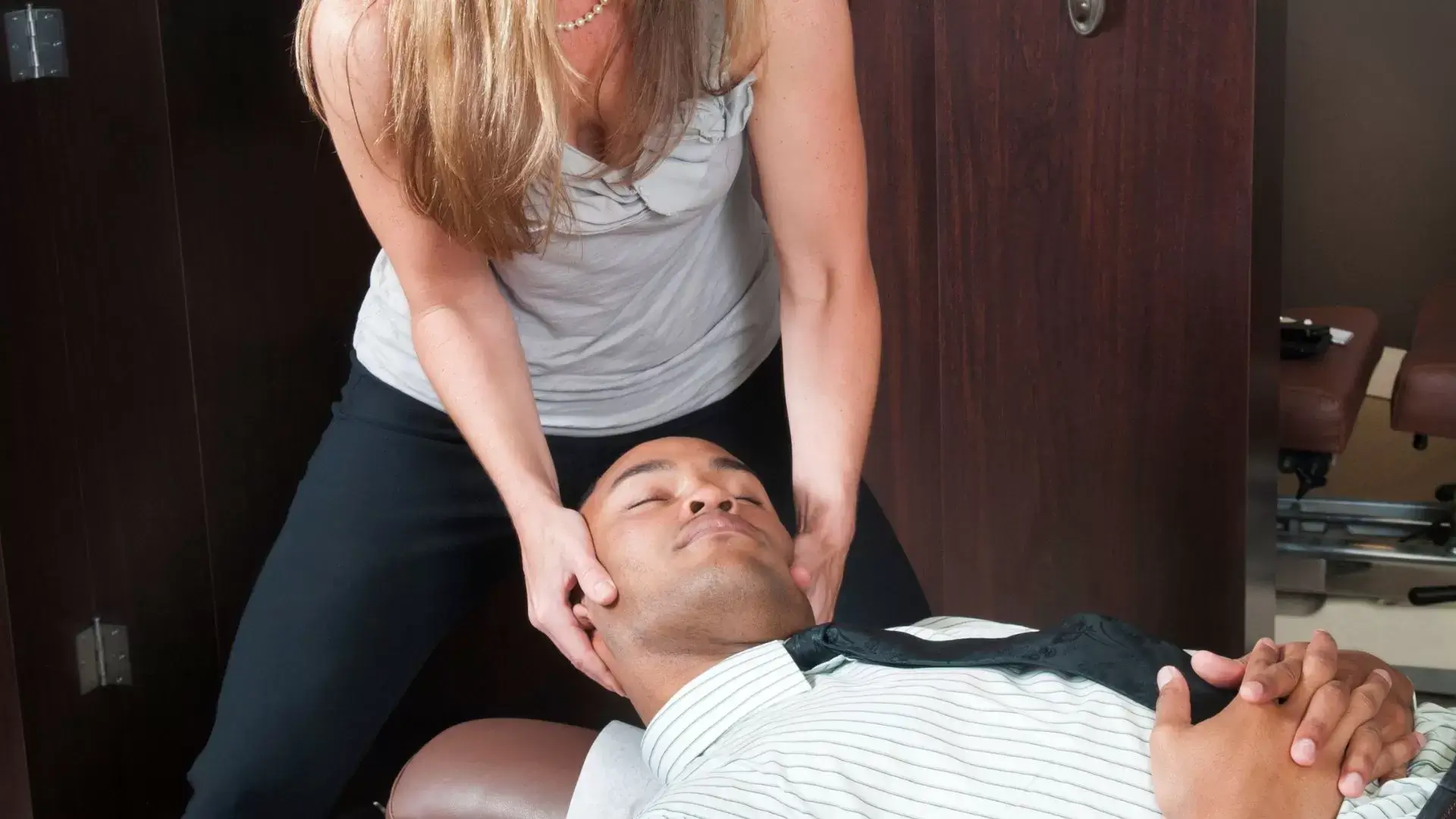We specialize in chiropractic care for vertigo in Mississauga, focusing on effective treatment tailored to your individual needs. Our approach includes spinal adjustments and vestibular rehabilitation therapy, which helps address misalignments that can contribute to dizziness and balance issues. By evaluating your specific symptoms and history, we collaborate with you to enhance stability and overall quality of life. Additionally, we offer personalized exercises and education to empower you in managing your condition. For those interested in understanding more about our methods and how they can aid recovery, there’s much more to discover.

At Mississauga Physio Chiro Clinic, we specialize in providing extensive physiotherapy and chiropractic services tailored to address a variety of conditions, including vertigo. Vertigo often stems from vestibular dysfunction, an issue that can greatly impair balance and coordination. Our Expert Physiotherapist & Chiropractor in Mississauga employs a thorough approach to treat balance disorders through targeted vestibular rehabilitation therapy (VRT), which is designed to alleviate symptoms associated with head movement sensitivity and inner ear disorders.
We recognize that each patient’s experience with vertigo is unique, and our physiotherapy and chiropractic services are customized to meet individual needs. By integrating vestibular rehabilitation techniques, we aim to enhance patients’ stability and overall function. Our multidisciplinary team collaborates closely with audiology specialists to guarantee a complete understanding of the underlying causes of vestibular dysfunction.
This collaboration enables us to create effective treatment plans that not only address the symptoms of vertigo but also target the root causes of coordination issues. Our goal is to empower patients to regain their balance and confidence, ultimately improving their quality of life. Whether you’re experiencing mild dizziness or more severe vertigo, we’re here to help you navigate your path to recovery.
Vertigo, a sensation of spinning or dizziness, can arise from various underlying causes, including vestibular disorders, migraines, and certain medications. Our understanding of vertigo encompasses symptoms like dizziness, unsteadiness, and a spinning sensation that can greatly impact daily life. The vestibular system, responsible for balance and spatial orientation, can be affected by conditions such as benign paroxysmal positional vertigo (BPPV), Meniere’s disease, and vestibular neuritis, leading to episodes of vertigo.
Additionally, cervical spine issues can contribute to vertigo through nerve compression or dysfunction, while anxiety can exacerbate sensations of dizziness, creating a cycle of distress. Motion sickness is another common trigger, where certain movements can provoke the spinning sensation.
We recognize the importance of identifying individual triggers and underlying causes to address vertigo effectively. By understanding the complexities of this condition, we can better support those experiencing it. Early recognition of symptoms and seeking appropriate care is essential for managing vertigo and improving overall quality of life.
Chiropractic care offers a unique approach to addressing vertigo by targeting underlying cervical spine issues and optimizing the function of the nervous system, which can greatly alleviate symptoms. As chiropractors, we recognize that many cases of vertigo stem from cervicogenic dizziness, where cervical spine dysfunction affects balance and proprioception. By employing specific chiropractic solutions, we can correct misalignments, enhance joint mobility, and improve overall function.
A thorough assessment often includes vestibular testing to identify the precise nature of balance problems. Once identified, we may employ techniques such as the Epley maneuver, which can help reposition displaced inner ear crystals, alleviating dizziness. Our focus on restoring cervical spine alignment can also reduce postural instability, further enhancing stability and coordination.
Moreover, regular chiropractic adjustments can support the nervous system, promoting better communication between the brain and the body’s balance systems. This holistic approach not only addresses the immediate symptoms of vertigo but also contributes to long-term wellness. By integrating neurotology principles, we aim to provide extensive care that empowers our patients to regain control over their balance and improve their quality of life.
Recognizing the various types of vertigo we can treat is essential for developing effective management strategies tailored to each patient’s needs. We often encounter positional vertigo, such as Benign Paroxysmal Positional Vertigo (BPPV), which can lead to episodes of intense dizziness triggered by specific head movements. Peripheral vertigo, often linked to conditions like ear infections or labyrinthitis, presents with symptoms of lightheadedness and nystagmus.
Central vertigo, arising from neurological issues, may manifest as more prolonged episodes of disequilibrium. Another common type we address is vestibular migraine, where dizziness accompanies headache symptoms. Each type of vertigo requires a nuanced approach to treatment.
To aid in recovery, we may recommend exercises like the Brandt-Daroff exercises, designed to alleviate symptoms by promoting vestibular adaptation. By distinguishing between these types of vertigo, we can better assess individual cases and create personalized care plans. Understanding the root cause of a patient’s vertigo allows us to implement the most effective chiropractic interventions, ensuring ideal outcomes and improved quality of life.

Misalignment of the cervical spine can greatly contribute to the onset and exacerbation of vertigo symptoms, highlighting the importance of a thorough assessment during treatment. When the cervical spine is misaligned, it can lead to increased tension and stress on the vestibular nerve, which plays a significant role in maintaining balance and spatial orientation.
Moreover, cervical spine misalignment may affect the inner ear’s fluid dynamics, potentially causing inner ear fluid imbalance. This imbalance is often a key factor in various types of vertigo, including visual vertigo. Individuals with a history of head trauma or concussions may experience exacerbated symptoms, as these injuries can further disrupt cervical alignment and vestibular function.
Additionally, misalignment can trigger panic attacks in some patients, compounding the vertigo experience and leading to a cycle of anxiety and dizziness. While an ENT specialist may utilize caloric testing to evaluate vestibular function, addressing cervical spine misalignment through targeted chiropractic care can be an effective complementary approach. By correcting these misalignments, we can help alleviate vertigo symptoms and improve overall balance and well-being.
Spinal adjustments can play an essential role in addressing dizziness and balance issues by restoring proper alignment and function to the vertebral column. When misalignments occur, they can disrupt the nervous system’s ability to communicate effectively, leading to symptoms such as vertigo, nausea, ear fullness, and tinnitus. Through chiropractic spinal adjustments, we aim to alleviate these symptoms and enhance overall balance.
By optimizing spinal function, we can improve gaze stabilization, which is critical for maintaining balance and preventing falls. Many patients experience muscle weakness and coordination difficulties, which can further exacerbate dizziness. Regular chiropractic care helps strengthen these areas, promoting stability and reducing the risk of injury.
In our practice, we emphasize the importance of a tailored approach to each individual’s needs. We assess the specific factors contributing to dizziness and balance issues to develop a personalized treatment plan. This may include chiropractic spinal adjustments alongside rehabilitative exercises aimed at improving muscle strength and coordination. Ultimately, our goal is to enhance our patients’ quality of life by effectively managing their symptoms and restoring functional balance.
The Epley Maneuver, along with other vestibular rehabilitation techniques, offers effective relief for patients suffering from Benign Paroxysmal Positional Vertigo (BPPV) by repositioning displaced otoliths within the inner ear. This technique focuses on the labyrinth and its otolith organs, which play a vital role in maintaining balance. By guiding patients through a series of specific head and body movements, we aim to alleviate symptoms of dizziness and vertigo associated with BPPV.
In addition to the Epley Maneuver, the Semont Maneuver serves as another valuable technique for managing BPPV. Both maneuvers require careful execution, often following an audiovestibular assessment to confirm the diagnosis is accurate and the right approach is taken. By employing these chiropractic techniques, we can help restore proper function to the vestibular system.
Rehabilitation through these methods not only addresses the immediate symptoms of vertigo but also promotes long-term stability and balance. Our goal is to empower patients to regain control over their daily activities, minimizing disruptions caused by dizziness. Through consistent practice of these techniques, we can enhance overall vestibular health and improve quality of life for those affected by BPPV.
By combining Vestibular Rehabilitation Therapy (VRT) with chiropractic care, we can create a detailed treatment approach that addresses both the mechanical and neurological aspects of balance disorders. VRT focuses on retraining the brain to interpret signals from the semicircular canals correctly, which is essential for managing conditions like vertigo, dizziness, and oscillopsia. Chiropractic care, on the other hand, targets any musculoskeletal issues that may exacerbate these symptoms.
Through this integrated approach, we can effectively address complications such as blood pressure fluctuations and orthostatic hypotension, which often accompany balance disorders. By improving the alignment of the spine and optimizing the function of the nervous system, chiropractic care can enhance the effectiveness of VRT. This synergy is particularly beneficial for patients experiencing endolymphatic hydrops, as it can mitigate symptoms while promoting overall vestibular health.
Together, we can tailor treatment plans that incorporate specific exercises from VRT alongside chiropractic adjustments, thereby ensuring a more thorough management of vertigo and related symptoms. Our goal is to provide patients with a holistic solution that not only alleviates their immediate symptoms but also improves their long-term quality of life.

Integrating postural therapy with chiropractic treatment can markedly enhance balance and stability for patients dealing with vertigo and related disorders. As chiropractors, we recognize that balance issues often stem from an interplay of vestibular dysfunction, musculoskeletal alignment, and postural imbalances. Through a thorough assessment, which may include tests like electronystagmography, we can identify the specific causes of dizziness and imbalance.
Postural therapy focuses on correcting body alignment and promoting ideal posture, which directly influences balance. By addressing issues such as ear pressure and the effects of hearing loss, we can help alleviate symptoms associated with conditions like superior canal dehiscence syndrome. Our chiropractic treatment aims to restore proper spinal function and enhance the nervous system’s ability to process sensory information.
As we work together, our goal is to provide a multifaceted approach that includes tailored exercises and adjustments to improve overall stability. By combining postural therapy with chiropractic care, we can empower patients to regain control over their balance and reduce the debilitating effects of vertigo. This integrated strategy not only targets the symptoms but also addresses the underlying causes, fostering long-term wellness.
Chiropractic approaches to addressing inner ear disorders and fluid imbalances focus on restoring ideal spinal alignment and enhancing the body’s ability to regulate vestibular function. Conditions like Meniere’s disease, migraine-associated vertigo, and perilymph fistula often result from or exacerbate fluid imbalances in the inner ear. By optimizing spinal alignment, we can improve nervous system communication, which may help in managing symptoms related to these disorders.
For instance, chiropractic adjustments can alleviate neck tension that contributes to dizziness and can positively affect the vestibular system. Additionally, addressing structural issues may reduce the impact of external factors such as barotrauma or ototoxicity, which can lead to vertigo.
In our practice, we also emphasize the importance of lifestyle modifications and exercises that promote balance and stability, as these can further assist in managing symptoms associated with fluid imbalances. By taking a holistic approach, we aim to empower our patients in their recovery journey, enhancing their overall well-being and reducing episodes of dizziness. Ultimately, our goal is to provide thorough care that addresses the underlying causes of inner ear disorders while improving quality of life.
Managing motion sensitivity and positional vertigo often requires a multifaceted approach, building on the foundational principles of chiropractic care that address inner ear disorders and fluid imbalances. As chiropractors, we recognize that vertigo can stem from various causes, including dehydration, low blood sugar, and underlying conditions like multiple sclerosis or brainstem disorders.
To effectively manage these symptoms, we utilize techniques such as videonystagmography to assess vestibular function, allowing us to tailor our treatments to each patient’s needs. Chiropractic care can help restore balance by adjusting spinal misalignments and optimizing nerve function, which may contribute to improved vestibular processing.
We also focus on educating our patients on lifestyle factors that may exacerbate motion sensitivity. For instance, ensuring adequate hydration and maintaining stable blood sugar levels can greatly reduce the frequency and intensity of vertigo episodes.
Supporting patients with neurological conditions that contribute to vertigo requires a thorough understanding of how these disorders affect balance and sensory processing. Conditions such as Meniere’s disease and acoustic neuroma can severely disrupt the inner ear’s function, leading to episodes of vertigo characterized by blurred vision and disorientation. Similarly, superior canal dehiscence syndrome (SCDS) presents unique challenges, as it compromises the vestibular system’s integrity.
In cases of stroke or transient ischemic attack (TIA), we recognize that the brain’s ability to process spatial information can be impaired, resulting in dizziness and imbalance. Multiple sclerosis (MS) and Parkinson’s disease further complicate these symptoms, as they can affect motor control and coordination, escalating the patients’ fear of falling.
Addressing vertigo effectively also involves considering dietary, hydration, and lifestyle adjustments that can greatly influence symptom severity and overall well-being. A well-balanced diet is vital, particularly for those dealing with Meniere’s disease or anemia, as nutritional deficiencies can exacerbate symptoms. We should aim for a diet rich in whole foods, such as fruits, vegetables, lean proteins, and whole grains, while avoiding excessive salt, caffeine, and alcohol, which can trigger episodes.
Hydration plays a significant role too; staying well-hydrated helps maintain inner ear function, which is essential for balance and can reduce instances of vomiting or difficulty focusing. It’s advisable to drink plenty of water throughout the day.
Lifestyle adjustments, such as regular exercise and stress management techniques, can also contribute positively to our overall health. For individuals with Parkinson’s disease, incorporating gentle movements may help enhance stability and reduce vertigo episodes.
If we’re experiencing persistent symptoms, contacting our healthcare provider at 1834 Lakeshore Rd W unit 6C, Mississauga, ON L5J 1J7, or calling for further evaluation is fundamental. We can also benefit from specialized assessments like ENG and VNG to better understand our condition.
Chiropractic therapy can greatly reduce fall risk and enhance stability by focusing on spinal alignment and improving neuromuscular function. By addressing misalignments in the spine, we can restore proper communication between the nervous system and the musculoskeletal system. This optimization leads to better balance and coordination, which are critical in preventing falls, especially in individuals experiencing vertigo.
Through specific adjustments and tailored exercises, we strengthen core muscles and improve proprioception. Proprioception, or the body’s ability to sense its position in space, is essential for maintaining stability. When we incorporate balance training into our chiropractic care, we further enhance our patients’ ability to navigate their environment safely.
Additionally, chiropractic therapy can help alleviate symptoms associated with vertigo, which may contribute to a heightened risk of falling. By managing these symptoms effectively, we can empower individuals to engage more confidently in daily activities.
Ultimately, our goal in chiropractic therapy is not only to relieve discomfort but also to equip our patients with the tools they need to maintain their stability and reduce the risk of falls. In doing so, we promote a healthier, more active lifestyle for those affected by vertigo.
While chiropractic therapy can greatly enhance stability and alleviate vertigo symptoms, there are instances when seeking additional medical care becomes necessary for thorough management of the condition. It’s important to recognize that vertigo can arise from various underlying causes, such as vestibular disorders, neurological issues, or cardiovascular problems.
In cases where we notice persistent or severe dizziness, visual disturbances, or accompanying symptoms like headaches or hearing loss, it’s imperative to consult a medical professional. These symptoms may indicate a need for further diagnostic evaluation, including imaging studies or blood tests, to rule out serious conditions.
Moreover, if we experience sudden onset vertigo or symptoms that worsen over time, seeking immediate medical attention is critical. While chiropractic care can effectively address musculoskeletal factors contributing to vertigo, it may not address the underlying medical issues.
Booking a consultation for professional chiropractic vertigo treatment in Mississauga can provide us with tailored strategies to manage and alleviate our symptoms effectively. By consulting with a licensed chiropractor, we can undergo a thorough assessment to identify the underlying causes of our vertigo. This initial evaluation typically includes a detailed medical history, physical examination, and specific tests to evaluate our balance and coordination.
During our consultation, we’ll discuss our symptoms and how they impact our daily lives. The chiropractor will then develop a personalized treatment plan that may include spinal adjustments, vestibular rehabilitation exercises, and lifestyle modifications aimed at reducing triggers. These evidence-based interventions can enhance our overall well-being and improve our quality of life.
It’s essential to approach vertigo treatment extensively, and our chiropractor will be equipped to guide us through this process. After our consultation, we can schedule follow-up appointments to monitor our progress and adjust our treatment plan as necessary. By taking this proactive approach, we can work collaboratively with our chiropractor to regain control over our symptoms and improve our daily functioning. Don’t hesitate to contact us and book your consultation today.
Situated in the Regional Municipality of Peel, Mississauga is one of Canada’s largest cities, known for its diverse population and vibrant economy. With a population exceeding 700,000, we represent a melting pot of cultures, contributing to the city’s rich social fabric. The city’s economy is robust, driven by sectors such as finance, technology, and manufacturing, making it an attractive destination for both businesses and residents.
Public transportation is well-developed, featuring the MiWay bus system and connections to GO Transit, facilitating easy access for those who seek chiropractic care for conditions like vertigo. Our city is also home to numerous parks and recreational facilities, emphasizing its commitment to promoting health and well-being among its residents.
In terms of healthcare, Mississauga offers an array of services, including specialized chiropractic clinics that focus on vertigo treatment. This accessibility guarantees that individuals experiencing vertigo have options for professional care. As we explore the significance of chiropractic treatment in managing vertigo, it becomes clear that Mississauga stands out not only for its economic vibrancy but also for its dedication to the health of its community.

A typical chiropractic session for vertigo usually lasts about 30 to 60 minutes. During this time, we focus on evaluating our patients’ conditions, discussing their symptoms, and performing necessary adjustments or therapies. It is crucial to allow adequate time for both evaluation and treatment, ensuring we address any underlying issues effectively. We often recommend multiple sessions to achieve the best results, depending on individual needs and responses to the therapy.
While chiropractic care can greatly alleviate vertigo symptoms for many individuals, it’s important to understand that it may not completely eliminate them. Each case is unique, and factors such as the underlying cause of vertigo play an essential role. We often see improvements in balance and reduction in dizziness through adjustments and other therapies. However, ongoing management and an all-encompassing approach are necessary to achieve the best outcomes for those experiencing vertigo.
When considering chiropractic treatments for vertigo, we should be aware that some side effects can occur. Commonly reported effects might include temporary discomfort, headache, or fatigue following the adjustment. While rare, more serious complications like exacerbated symptoms or neurological issues can arise. It’s crucial to communicate openly with our chiropractor about any concerns and monitor our responses to treatment, ensuring we make informed decisions about our health and well-being.
When addressing vertigo relief, we typically find that the number of sessions required can vary considerably based on individual circumstances. Generally, patients might need anywhere from three to ten sessions to experience noticeable improvement. It’s essential to assess each case carefully, as factors like the underlying cause of vertigo and response to treatment play key roles. We recommend a tailored approach, ensuring that we monitor progress and adjust the treatment plan as needed.
When considering if chiropractic care is safe for all age groups experiencing vertigo, we must recognize that, generally, it is deemed safe for most individuals. However, it’s essential for us to assess each patient’s unique health history and specific condition. We should always consult with healthcare professionals before starting treatment, ensuring that any underlying issues are addressed, and determine if chiropractic adjustments are appropriate for their age and health status.
Reach out to us today to book an appointment or learn more about our services. Our friendly team is here to answer your questions and help you take the first step toward improved health and wellness.
(647) 372-1209

At our “Mississauga Physio Chiro Clinic”, we are dedicated to providing personalized care that addresses the root cause of your discomfort. With a team of experienced physiotherapists and chiropractors, we focus on restoring your mobility, relieving pain, and enhancing your overall well-being.